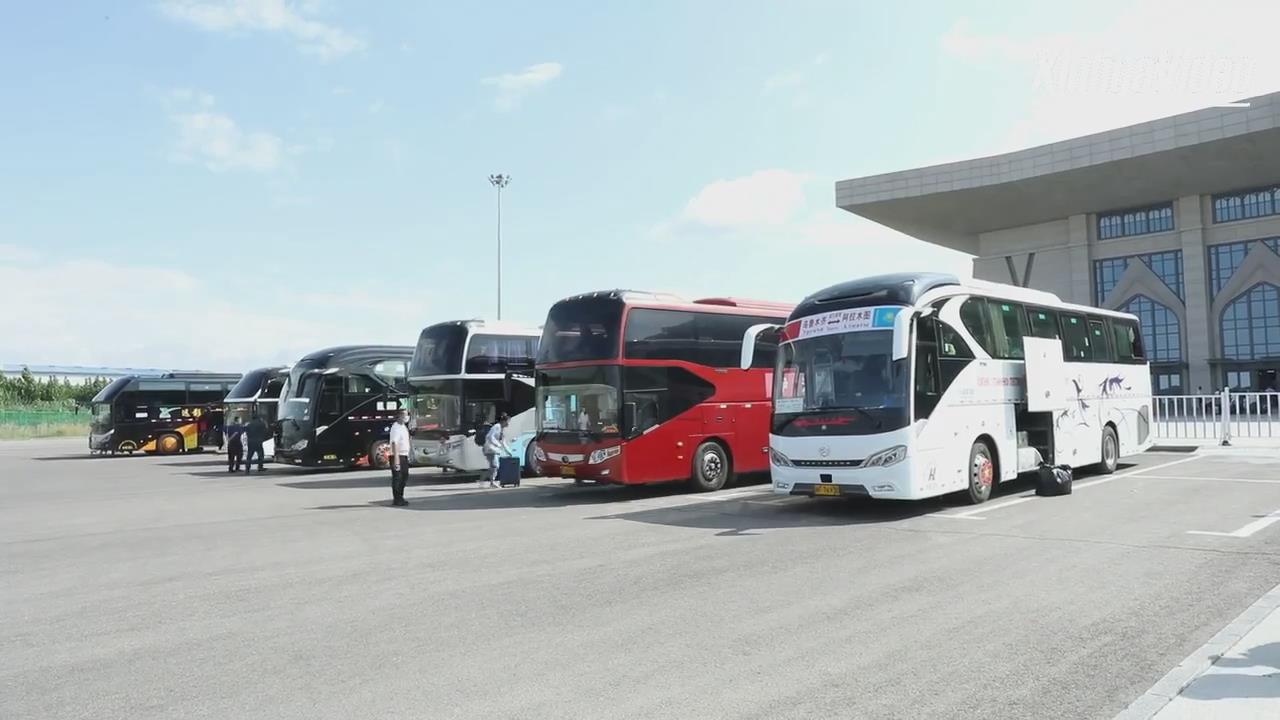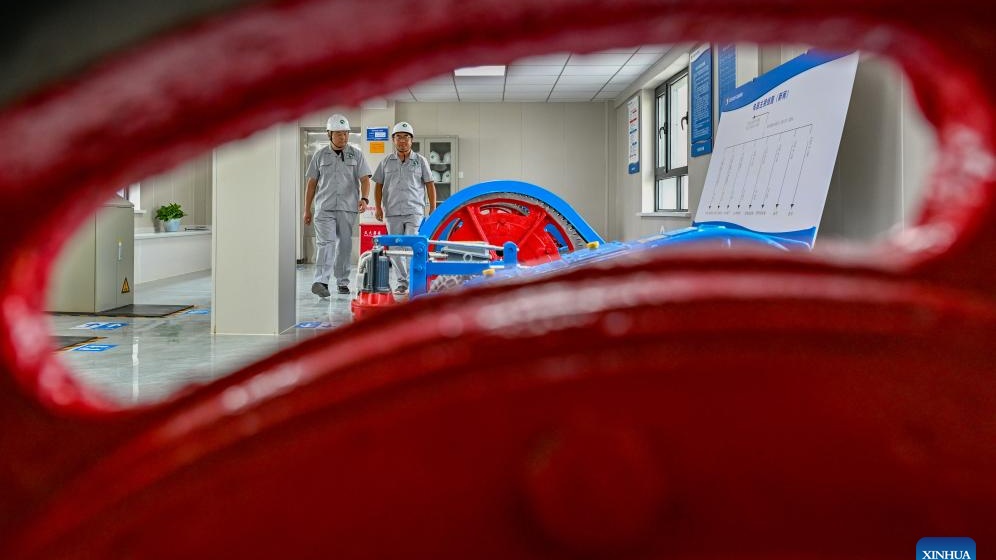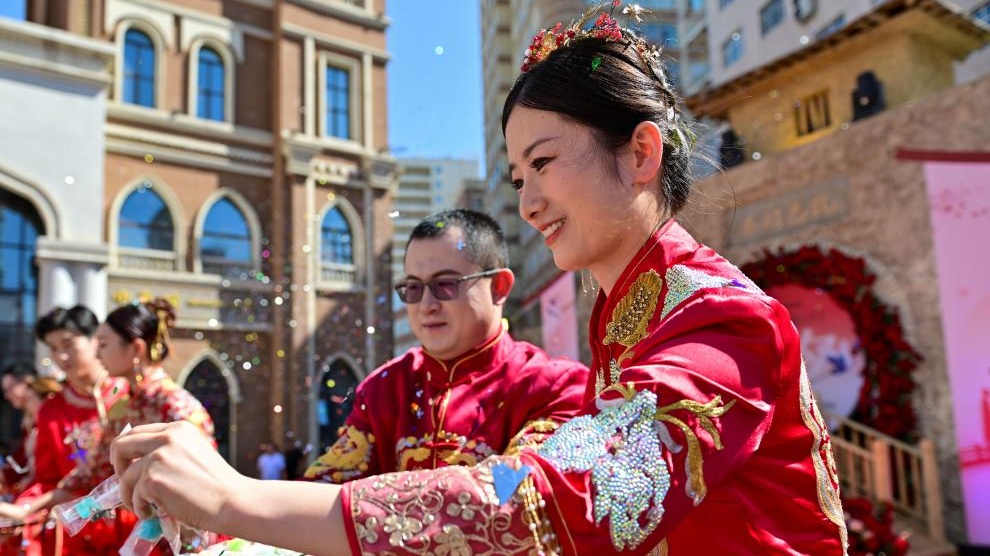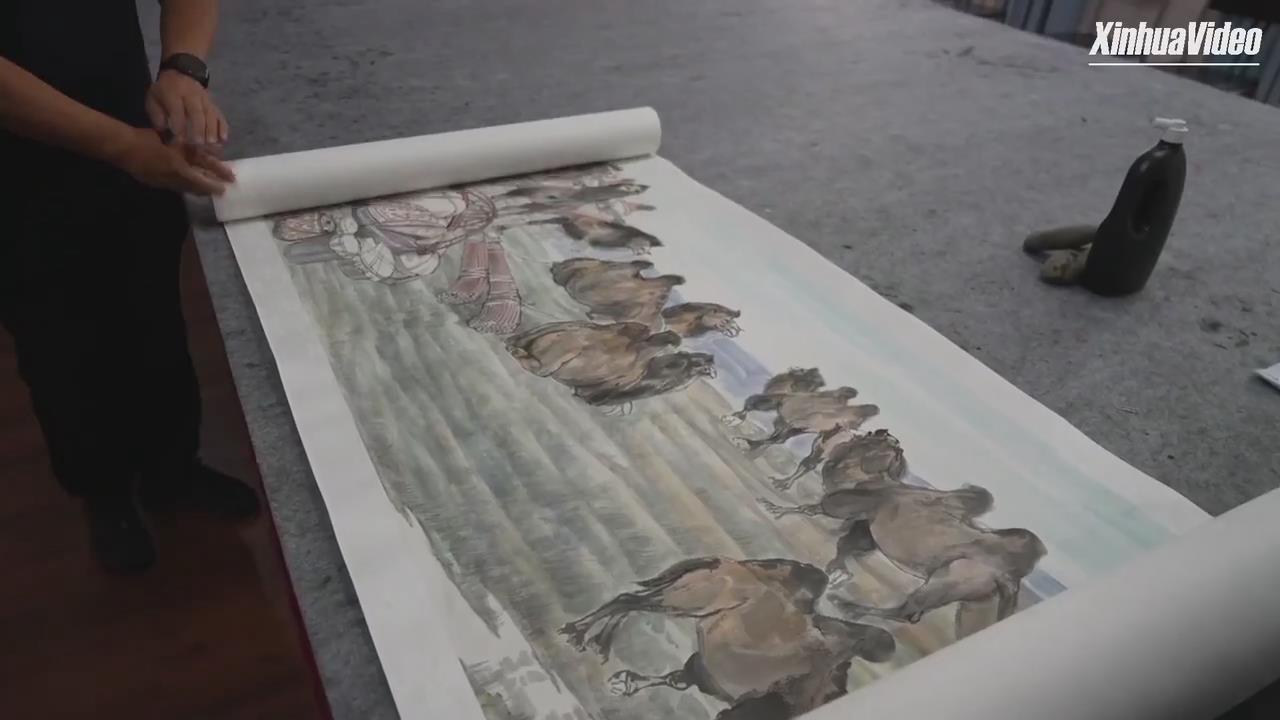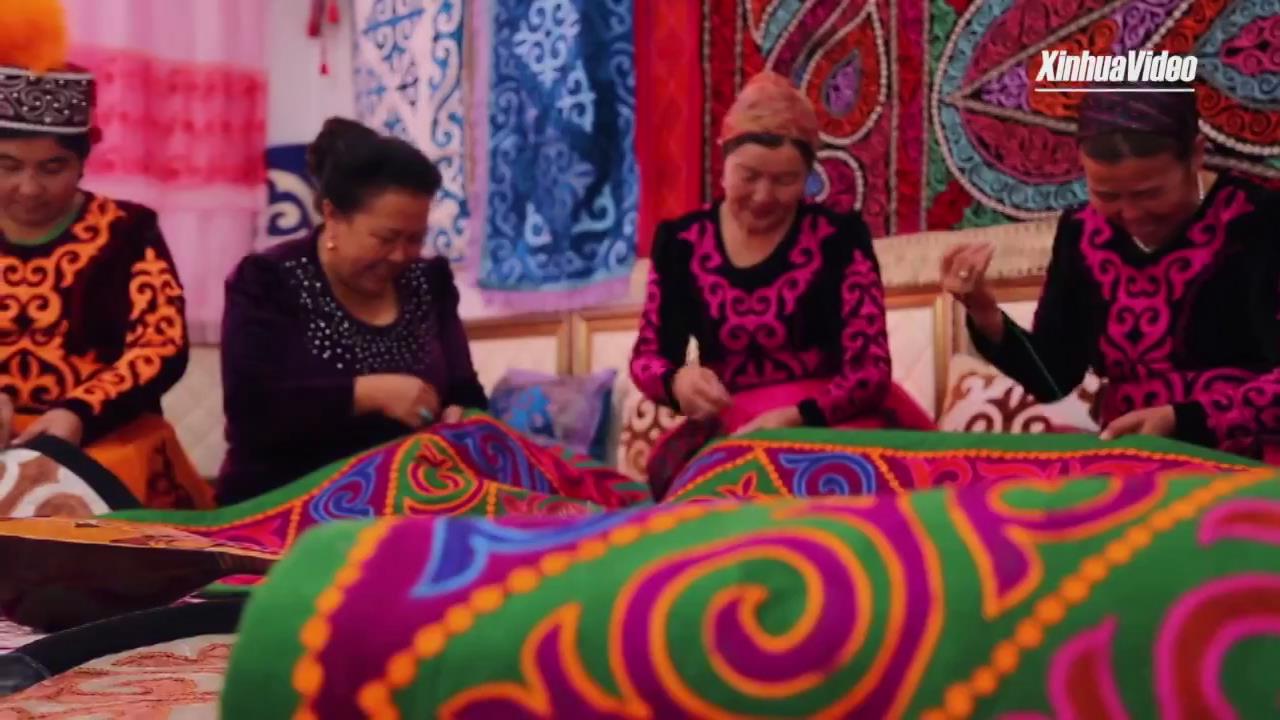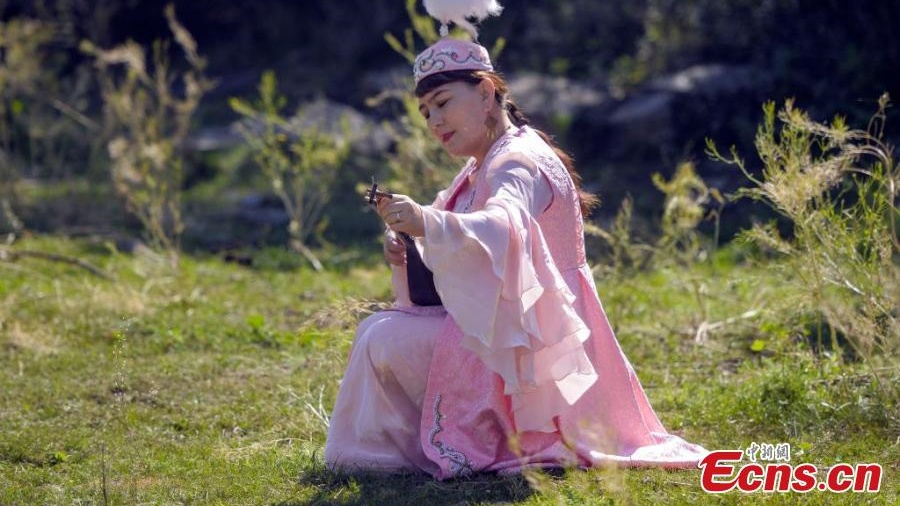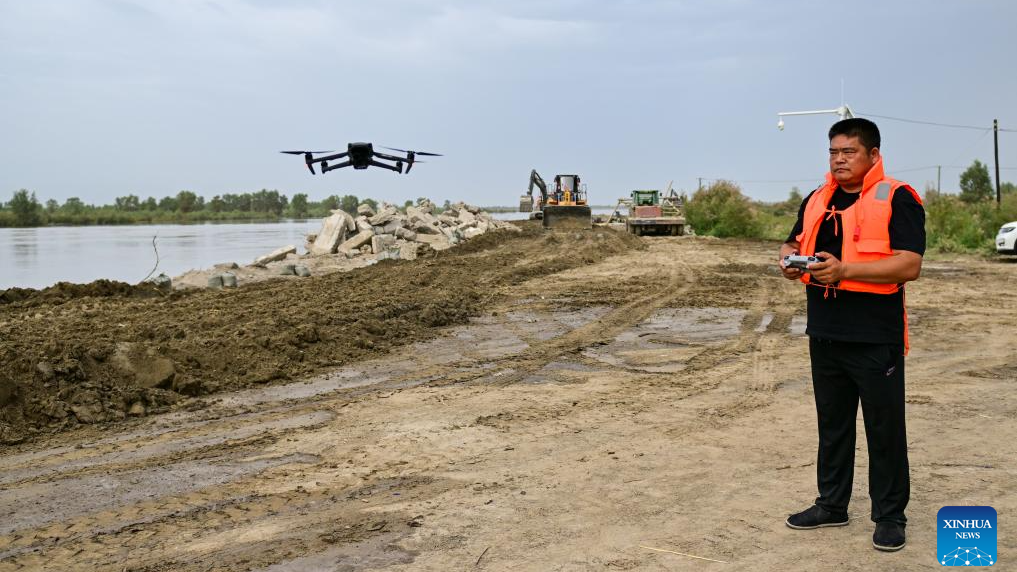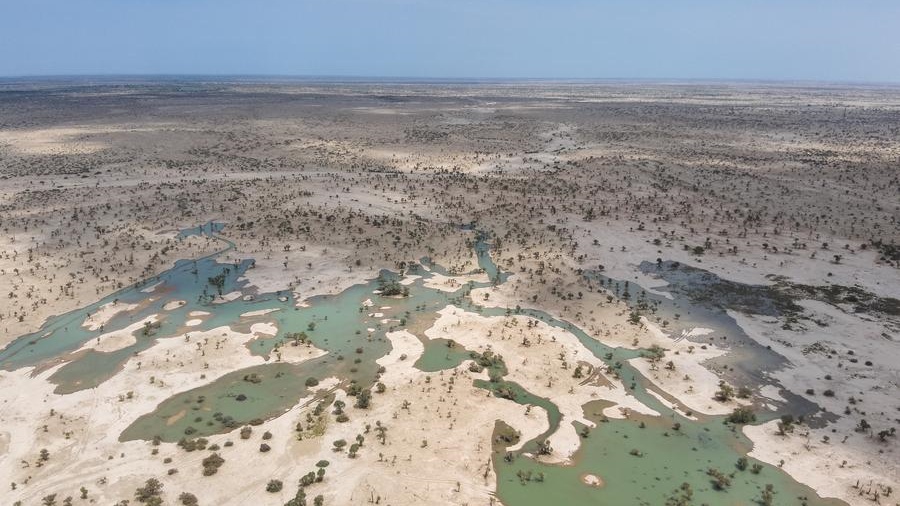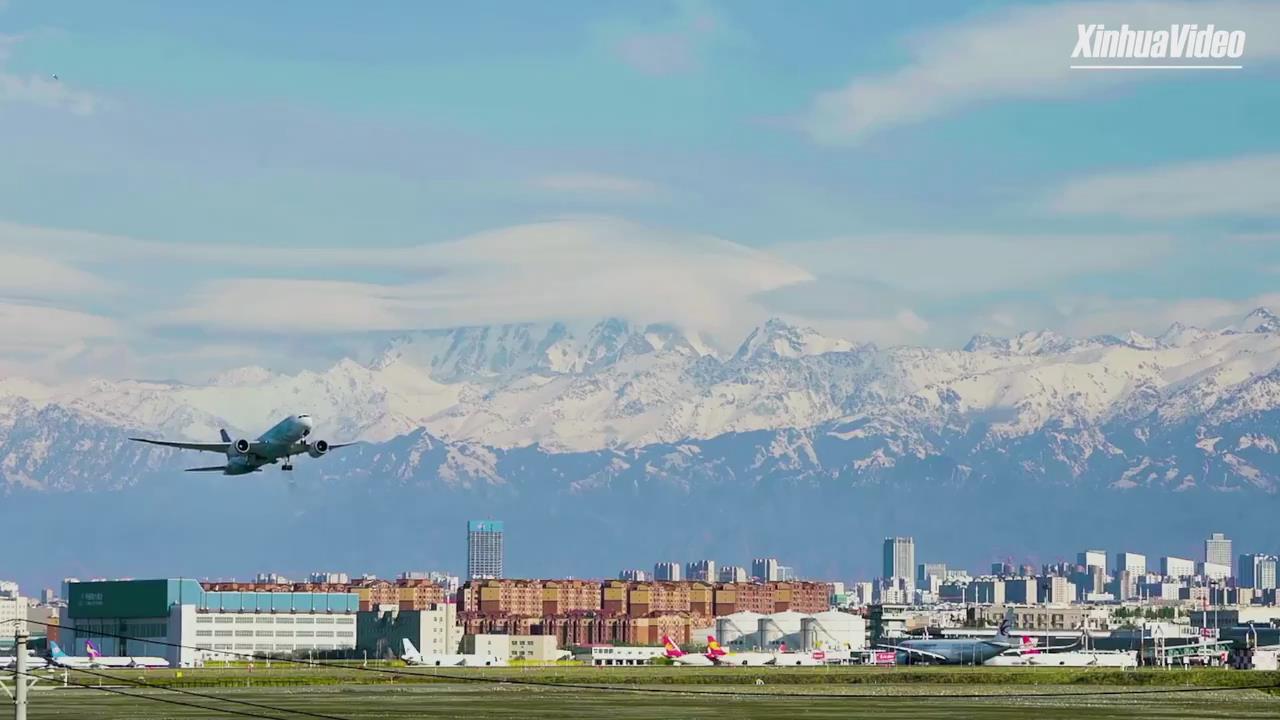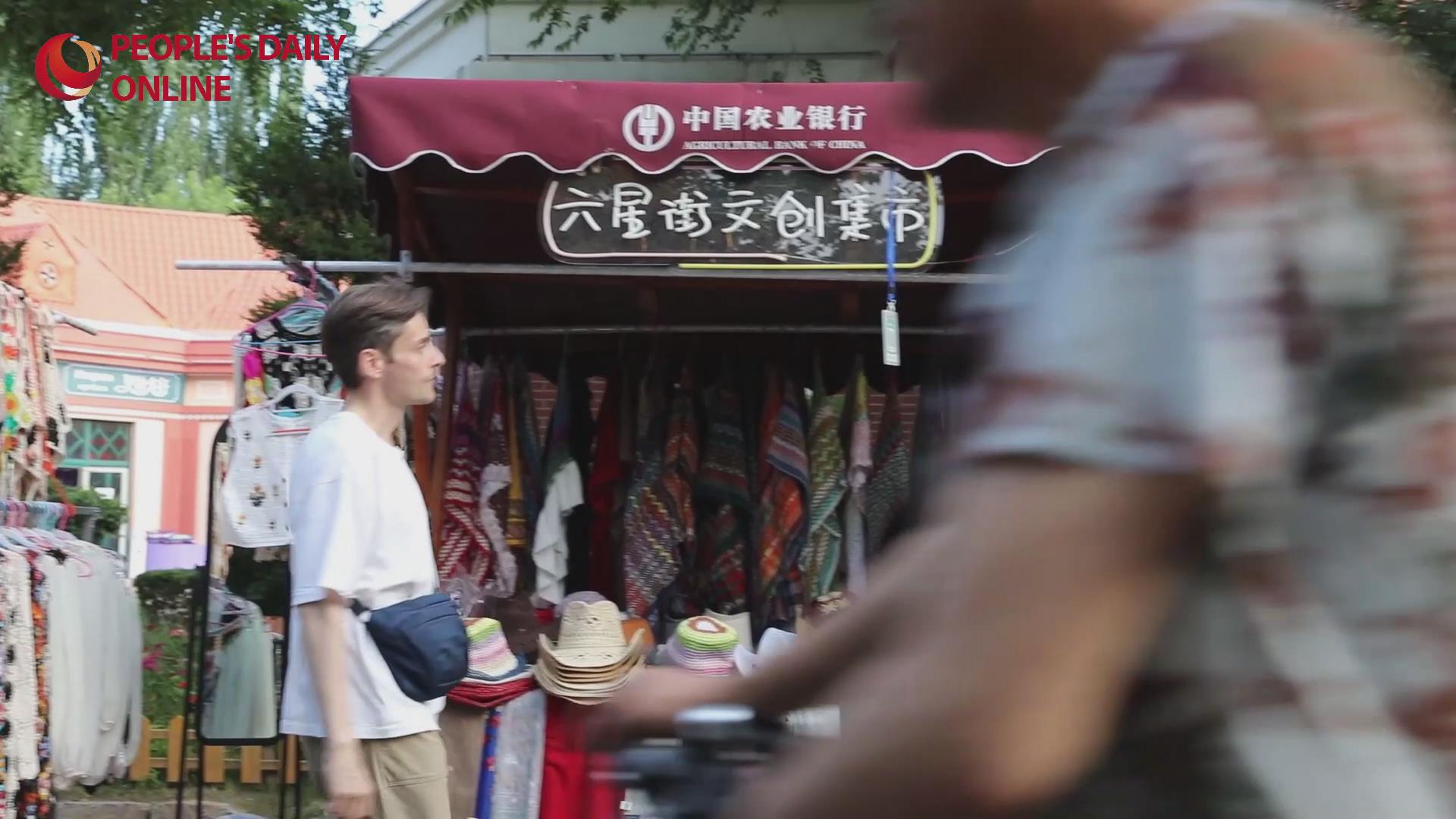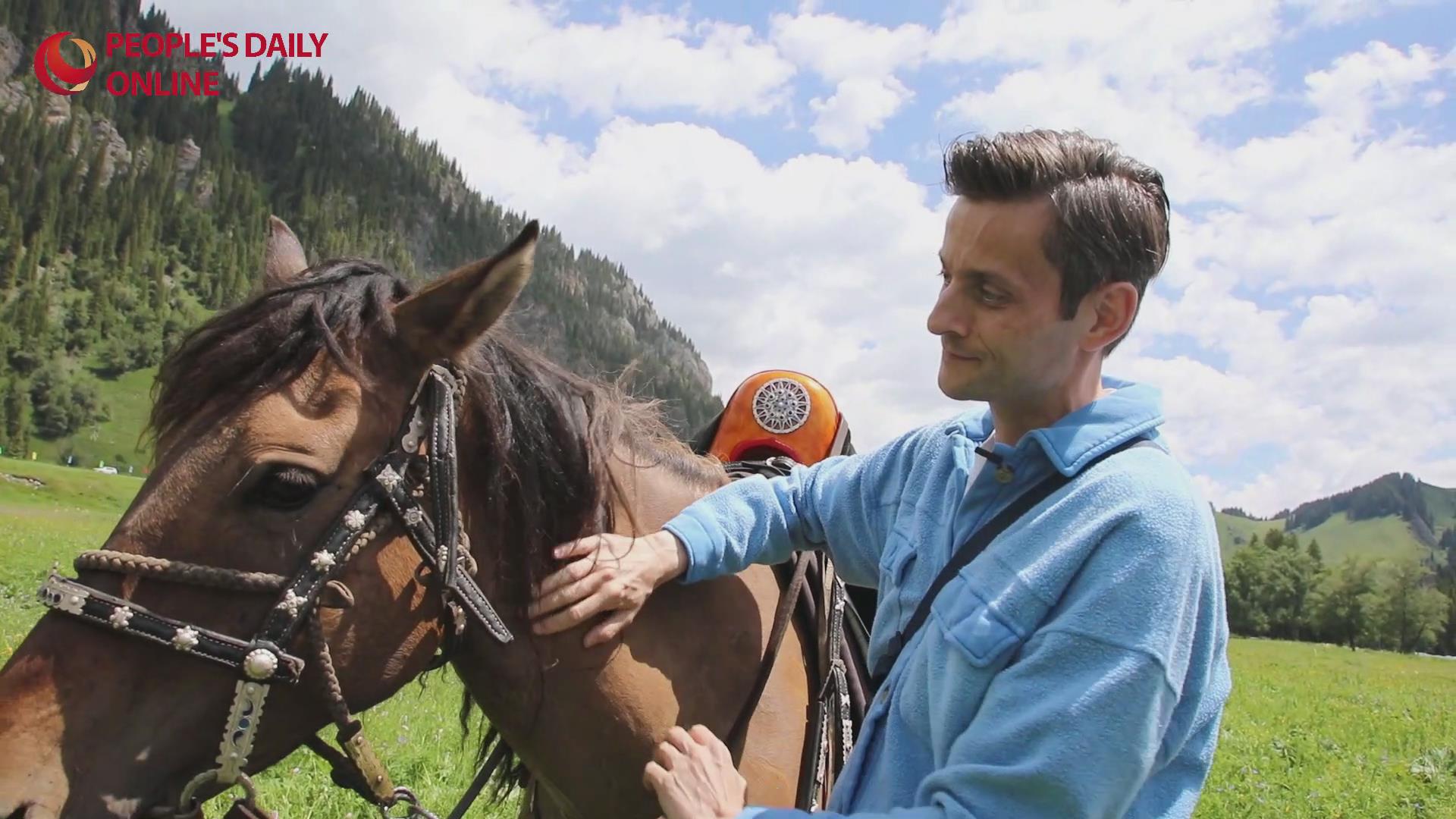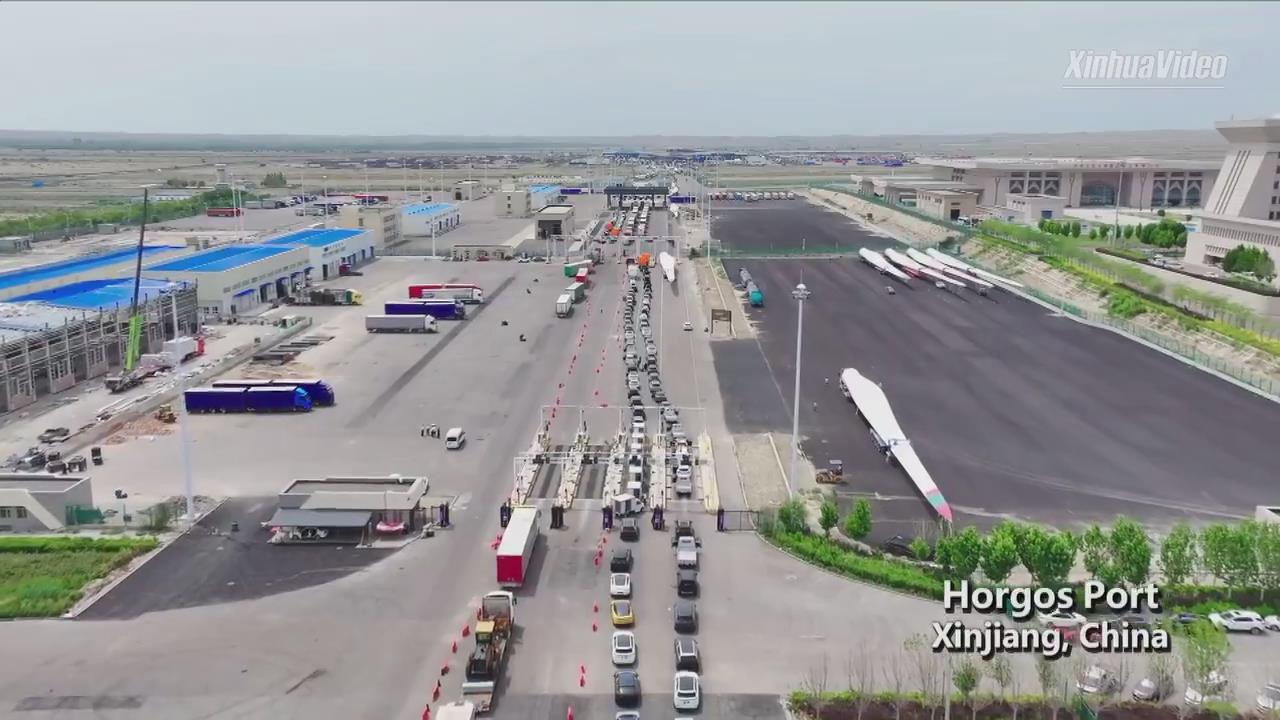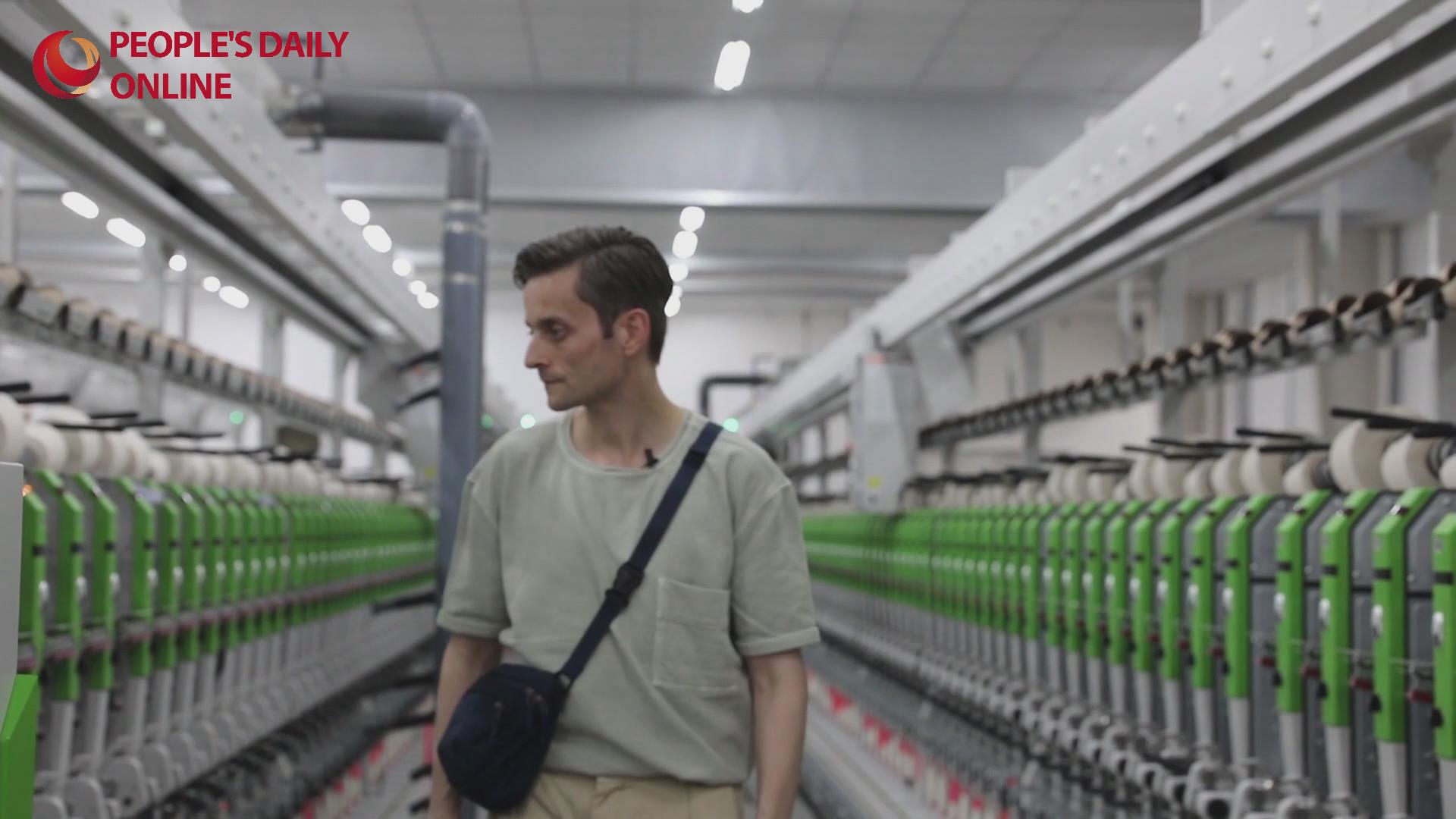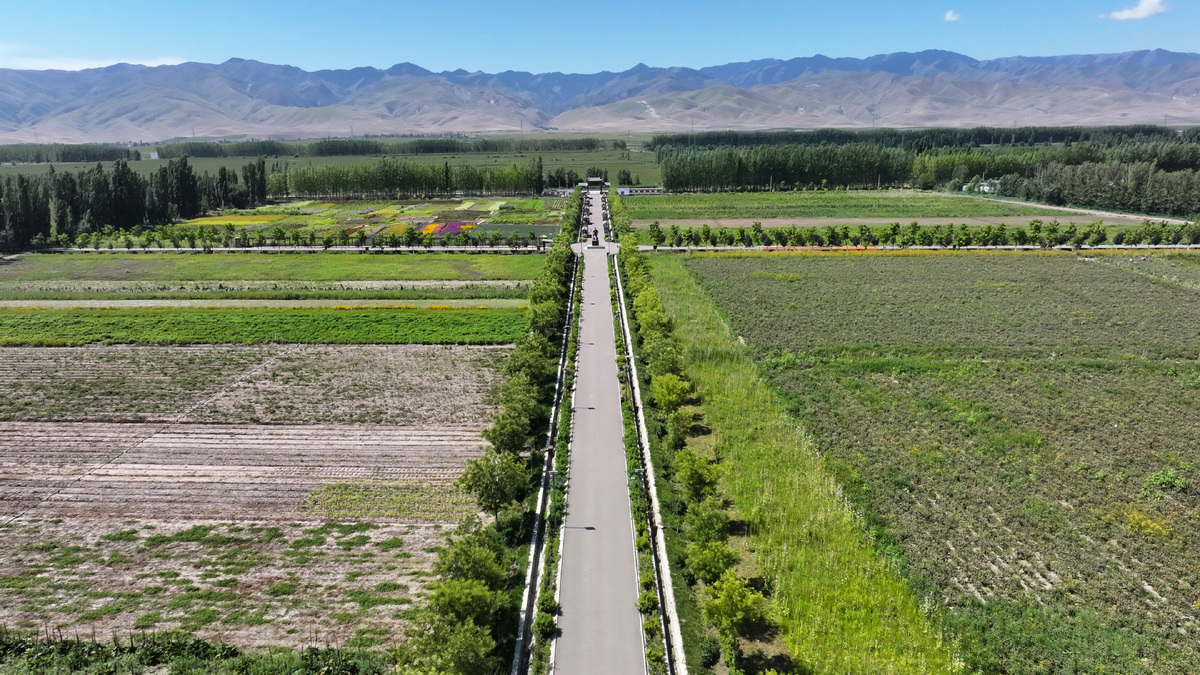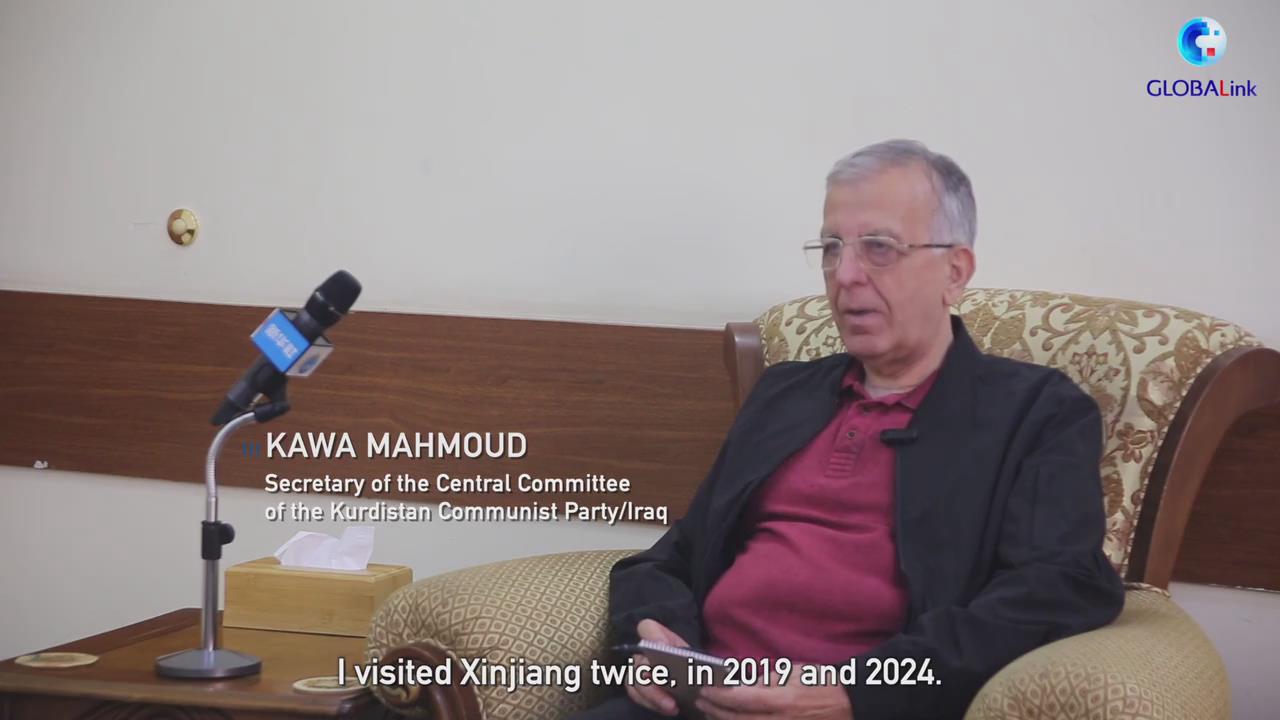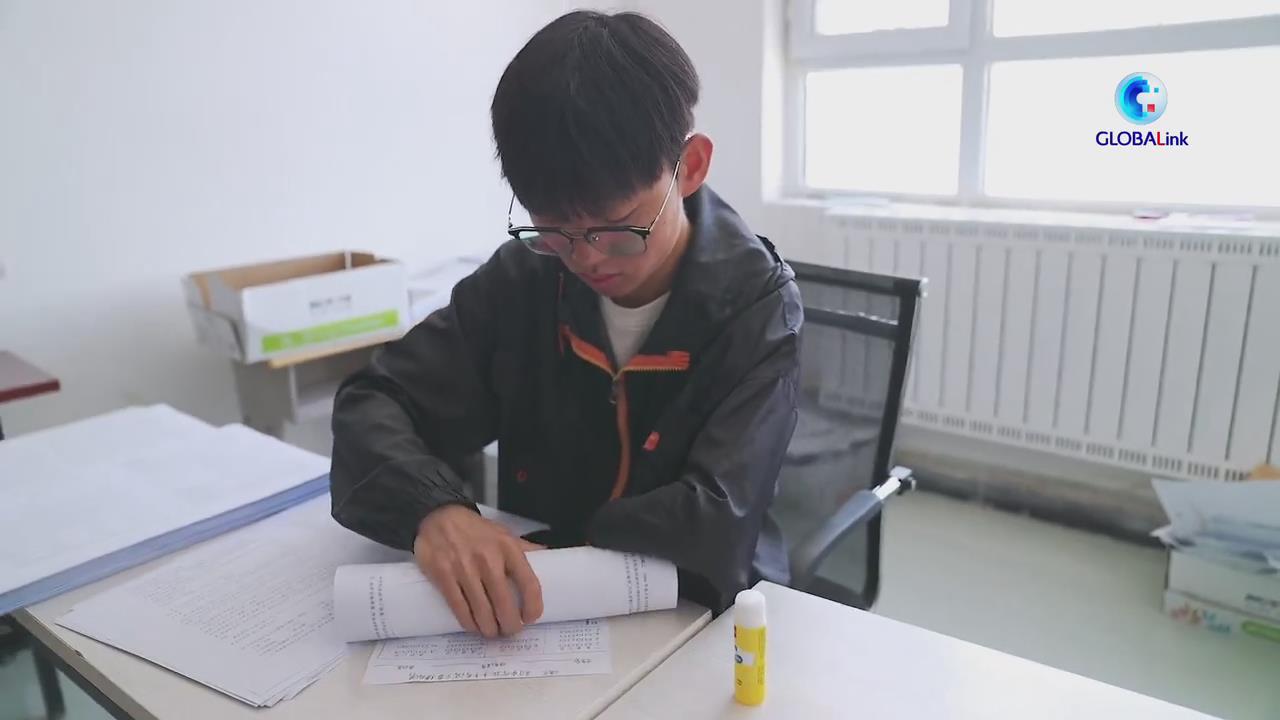
Photo taken on February 10, 2021 shows the 4th Press Conference on Xinjiang-related Issues held in Beijing. Photo by Wang Zhen
Bi Haibo: Welcome to attend the fourth Press Conference on Xinjiang-Related Issues co-hosted by Ministry of Foreign Affairs and Xinjiang Uygur Autonomous Region. Today we’re honored to invite Xu Guixiang, the Deputy Director-General of the Publicity Department of the CPC (Communist Party of China) Xinjiang Autonomous regional Committee, Elijan Anayat, the Spokesman of the People's Government of Xinjiang Uygur Autonomous Region and graduated trainees in different trades and profession. The theme of today’s press conference is about trainees of the Vocational Education and Training Centers in Xinjiang.
Now we start taking questions from the floor. Let’s start from People’s Daily.
People’s Daily: From the white paper Vocational Education and Training in Xinjiang, we know that vocational education and training centers help those influenced by religious extremism, petty crime offenders and law breakers to get rid of religious extremism. Could you ask graduate trainees to talk about how they were influenced by religious extremism and how did they finally get rid of it with the help of vocational education and training centers?

Deputy Director General of CPC Publicity Department of Xinjiang Uygur Autonomous Region Xu Guixiang answers questions at the 4th Press conference on Xinjiang-related Issues in Beijing, February 10, 2021. Photo by Wang Zhen
Xu Guixiang: Alimjan Mamatali, a graduate from vocational education and training center in Hotan, and Bahitgul Tursun, a graduate from vocational education and training center in Wensu County, Aksu Prefecture answer this question.

Alimjan Mamatali, a graduated trainee from Hotan answers this question at the 4th Press conference on Xinjiang-related Issues in Beijing, February 10, 2021. Photo by Wang Zhen
Alimjan Mamatali: Hello! My name is Alimjan Mamatali, 28 years old. I am a graduate trainee of vocational education and training center in Hotan city, Hotan Prefecture. Now I work in a real estate company.
I ran jade business before and met so-called “friends”. They told me that: “Paradise is a more magnificent wonderland where you can have 72 beautiful wives. You will have endless money to spend and a sea of delicacy to enjoy. It is a life-long goal for Muslims.” I asked them curiously: “How to enter paradise?” They told me that: “Pray to Allah each day leads to paradise, with participating in jihad and killing pagans as the precondition though.”To live in paradise, I believed in their bullshit, hanging out with them all day. Later on, they gave me a passport and a route map of “jihad”. They asked me to depart from Guangdong for jihad in other countries. I gave up my businesses so as to realize my dream of “engage in a holy war and die for their beliefs in order to enter paradise.”
With a fake passport, I was caught by Guangdong public security organs on my way out. They sent me back to Hotan. Notified by public security organs, I realized that I committed the crime of crossing the border illegally which would be sentenced to no more than 3 years. I was dumbfounded and scared. The paradise I aspired suddenly turned to prison. The police told me that the government set up vocational education and training centers to salvage people like me. He suggested me to study there.
In the vocational education and training center, I studied the Constitution, Criminal Law, Counter-terrorism Law, Regulations on Religious Affairs, Regulations on Deradicalization. I knew the boundary of law and what is the right thing to do. The evil intent violent extremists want us to be slaughter machines and cannon fodder of crime offenders. I realized at that moment that what they told me was fake. “engage in a holy war and die for their beliefs in order to enter heaven” is fake too. I’m deeply regret for my silly behavior which almost devour my life. I would fall into the abyss of evil and be a slaughter machine without rehabilitation from the vocational education and training center. I am so scared when I think of it.
In the vocational education and training center, I’ve learned marketing management. After graduation, a stable job in the real estate company brings me satisfactory income. I got married last year, and bought a new car. My parents are assured to my changes. We live a good life and are grateful to the vocational education and training center.
Xu Guixiang: Now welcome Bahitgul Tursun to share her experience with us.

Bahitgul Tursun, a graduated trainee from Wensu County, Aksu Prefecture answers this question at the 4th Press conference on Xinjiang-related Issues in Beijing, February 10, 2021. Photo by Wang Zhen
Bahtigul Tursun: My name is Bahtigul Tursun, a graduate trainee of Wensu County, Aksu Prefecture. I am director of logistics in hydroelectric station of the town.
A few years ago, my daughter was ill. A friend persuaded me not to send her to hospital for more sufferings. She said that the village “Imam” Amat Mamat was more preferable than doctors and gave me his phone number. I want to have a try, so I come to the “Imam” for my daughter’s disease. He pretended to treat my daughter and told me that “you should not go to public hospitals. Han doctors are pagans and their non-halal prescriptions are lethal.” “Don’t associate with Han people. Making friends with pagans will bring you to the hell.”
From then on, I came to the “Imam” whenever my kid was ill. He infused me with religious extremism, so I regarded Han people as “pagans” and harbored hatred for them. To get away from them, I even resigned from the hydroelectric station. I refused to buy anything in Han people’s shops, because their goods are dirty and non-halal. There are non-halal books and pens in schools launched by the government, thus I didn’t allow my daughter to to to school. My behaviors frightened my relatives and friends. I was convinced by them to go to the vocational education and training centers.
I’ve learned a lot of legal knowledge in the vocational education and training center. I had a clear concept of what is Islam. I realized that the “Imam” is not religious clerk but a violent extremist. He was in prison for perpetrating terrorist activities. Many of classmates in the vocational education and training center were induced by extremists. They lost their jobs and families. All of them detest extremism.
After my graduation, I returned to the hydroelectric station for work with the help of community cadres. I have been promoted to director of logistics. With higher income, the economic conditions of my family have been improved. Our family of four lives a happy life.
Bi Haibo: Next question is from Associated Press of Pakistan.
Associated Press of Pakistan: Some foreign media alleged that “the vocational education and training centers are concentration camps” and “Xinjiang detained a million Muslim minorities”. What is your comment on this?
Xu Guixiang: Elijan Anayat, spokesperson for people’s government of XUAR answers this question.

Spokesperson of Information Office of People’s Government of Xinjiang Uygur Autonomous Region Elijan Anayat answers this question at the 4th Press conference on Xinjiang-related Issues in Beijing, February 10, 2021. Photo by Wang Zhen
Elijan Anayat: I want to make it clear again that there has been no so-called "concentration camps" in Xinjiang. However, some foreign politicians and media are holding ill-intentions, labeling vocational education and training centers in Xinjiang as "concentration camps". The vocational education and training centers legally established in Xinjiang were actually schools with the character of de-radicalization, which are no different in essence from the DDP (Desistance and Disengagement Programme) in the UK, and the de-radicalization centers in France, all being conducive attempt and proactive exploration for preventive counter terrorism and de-radicalization. The education and training efforts in Xinjiang are also in line with the basic principles in the relevant international conventions and initiatives such as UN Global Counter-Terrorism Strategy and Plan of Action to Prevent Violent Terrorism.
The basic principle of respecting and protecting human rights in accordance with China’s Constitution and laws is strictly observed in these centers to guarantee that the personal dignity of trainees is inviolable. Personal insult and maltreatment in any way is strictly prohibited. All trainees enjoy freedom of movement and connection with their families or friends. The centers are run as boarding facilities and trainees can go home and ask for leave to attend to personal businesses. Trainees’ right to use their own spoken and written languages is fully protected. All rules, regulations, curriculum tables and menus are in the common language and languages of ethnic minorities. The customs and habits of different ethnic groups are fully respected and protected, kinds of halal food, which were full rich in nutrition, applied by those centers. Trainees could have 20 yuan each day as the food weighting, Trainees can decide on their own whether to attend legitimate religious activities when they go home. The vocational education and training centers are well equipped with different kinds of living facilities. There are radios, TVs and air conditioners in the dormitories. Medical facilities in the centers are available to trainees, which provide health and treatment service. The centers also have sports venues for the trainees to play basketball, volleyball and table tennis, cultural venues such as reading room, computer room and projection room, and auditorium and outdoor stage. Ethnic singing and dancing show and sports game are often held in the centers. Trainees’ learning, living and recreational needs can be fully satisfied in the centers. We set up medical room and made 24 hours medical service for trainees. The trainees who had slight illness could get treatment there and we also supply the service to send them to the hospital as soon as possible when emergency and severe cases happened. The centers also set up legal consulting room for helping trainees to solve their legal problems and questions. Mental consulting room were also set up there, the centers applied mental services and care about trainees’ psychological health. Does this kind of “concentration camp” exist in the world? On December 9, 2019, all trainees had graduated from the centers after completing their courses. They have found jobs and their quality of life has improved on the help of government.
The so called “vocational education and training centers are concentration camps where up to one million Uygurs are detained” is an outright nonsense. In according with laws, the vocational education and training work in Xinjiang insisted that all the work targets no locality, ethnicity, and religion. The trainees were infected with religious extremism and had no relations with their ethnicity or beliefs. The Grayzone, an independent news website has published articles to expose that such horrible rumors were created and spread by Chinese Human Rights Defenders, an NGO supported by the US government, and some anti-China forces. Firstly, Chinese Human Rights Defenders got to the conclusion that among the 20 million people of Xinjiang, 10% were detained in the reeducation camps based on the interviews of eight Uygurs. Secondly, the false scholar Adrian Zenz fabricated such rumors according to one media’s report. He himself admitted that his estimate is not certain. On July 25, 2020, Max Blumenthal, an award-winning journalist and the author of several books, spoke at an international symposium “No to New Cold War” that many media reports alleging an astonishing number of a million Uygurs being detained are based on shaky source of information that doesn’t stand up to scrutiny.
On August, 2019, the State Council Information Office of the People’s Republic of China published the white paper named Vocational Education and Training in Xinjiang. The white paper elaborated sympathetically all the respects of education and training works in Xinjiang, including the backgrounds, legislative authorities, contents of training, measures for management, protection of trainee’s rights and remarkable effects. On August, 24th, 2020, CCTV International Chinese Channel broadcast a TV documentary titled “Lie and the Truth—A Documentary of Xinjiang Education and Training Center”, which vividly displayed the real study and life of trainees in the education and training center with real stories and scenes, deeply reflected the tremendous thought and life changes that education and training works brought to those trainees. We brought those videos or books for you and we will send to you after the press reference. I convict that you will explore the real face of the vocational education and training center and works insides.
Bi Haibo: Next question is from Xinhua News Agency.
Xinhua News Agency: We noticed some reports said “trainees were tortured and even their kidneys and livers were removed.” Meanwhile, some overseas who said that they had the experiences in the center also told the media that they got brainwash and torture in the education and training center. Would you mind telling me are those reports true or not?
Xu Guixiang: Mardanjan Ilham, a graduated trainee from the education and training center of Atush City, Kizilsu Kirgiz Autonomous Prefecture and Ali Tuniyaz, a graduated trainee from Awat County, Aksu Prefecture answer this question.

Mardanjan Ilham, a graduated trainee from Atush City, Kizilsu Kirgiz Autonomous Prefecture answers this question at the 4th Press conference on Xinjiang-related Issues in Beijing, February 10, 2021. Photo by Wang Zhen
Mardanjan Ilham: My name is Mardanjan Ilham. I am a graduated trainee from the education and training center of Atush City, Kizilsu Kirgiz Autonomous Prefecture. I hold an extracurricular institution for middle and primary school students.
As a graduated trainee, I knew clearly about the center. The education and training center is a school. Every classroom is big and bright, equipped with multi-media tools that convenient for our study. We had 6 classes every day from Monday to Friday and we could break off during Saturday, Sunday and other national holidays. We could ask for leave in the school when we need. Of course, we can contact with my relatives. I remember that once my parents called me that one of my relative would get married. I asked for one day off for attending his wedding. I brought wedding sugar for my classmates. In the school, we had colorful extracurricular activities. We hold many activities, such as the basketball competition, tug of war tournament, and art show. My class owned the first place in the tug of war tournament. The school respected our customs, they applied Halal food by free every day, such as noodles, pilaf, steamed bun and vegetable porridge. Our teachers, just like our family members, took care of us when we got illness. I could remember that once I got the ankle hurt after playing basketball and missed the lunch, our teacher brought herbs and medicines in the first place when he knew what happened. He even brought me a plate of noodles with mutton. I was very touched.
The foreign media said that the trainees were abused and even their kidneys and livers were removed are totally lies and slanders. All of my classmates were very happy and took ease. No abuse happened, let along the removal of kidneys or livers. We are healthy and we are enjoying our happy family lives. I would like to ask a question to those who said they were trainees in other counties, your lies could cheat someone, but could you cheat us? Thank you!
Xu Guixiang: Now welcome Ali Tuniyaz to share his experience with us.

Ali Tuniyaz, a graduated trainee from Awat County, Aksu Prefecture answers this question at the 4th Press conference on Xinjiang-related Issues in Beijing, February 10, 2021. Photo by Wang Zhen
Ali Tuniyaz: I am Ali Tuniyaz, a graduated trainee from the Vocational Education and Training Center of Awat County, Aksu Prefecture. Currently I am the legal representative of a construction company.
In the vocational education and training center, teachers cared for us. What moved me most is that our headteacher remembered the birthdays of all my classmates. Whenever my classmates celebrated their birthdays, they would receive her blessing. What’s more, she could discover the speciality of every trainee, and always try every means to encourage us. We liked to chat with her, feeling that she was not only a teacher, but also an “agony aunt.” When I first entered the center, headteacher arranged me to teach the standard spoken and written Chinese as a “teacher” because of my good Chinese foundation, which made me proud and excited. At the center, teachers cared about us like family members, and students helped each other like brothers and sisters. From then on, we have forged a profound friendship and stayed in frequent contact with each other. Several of my classmates and me invited our headteacher to dinner and talked a lot about our center last Saturday, and we all miss that time.
My classmates and I have never heard of trainees being abused or removing kidneys. You see, we are so cheerful and healthy. Do we seem to be abuse? I ask those overseas media to stop lying through one’s teeth.
Bi Haibo: Next question is from CGTN.
CGTN: Someone overseas told the media that female trainees in vocational education and training centers were forced to inject unknown drug or implant contraceptive rings implantation, existing forced sterilization. Is it true?
Xu Guixiang: We have invited Turdigul Nur and Mihrensa Qari, two graduates of the vocational education and training center in Kashgar City to answer this question.

Turdigul Nur,a graduated trainee from Kashgar City answers this question at the 4th Press conference on Xinjiang-related Issues in Beijing, February 10, 2021. Photo by Wang Zhen
Turdigul Nur: Hello! I am Turdigul Nur from Kashgar City. I graduated from the vocational education and training center. After graduating from the vocational education and training center, my husband and I had a daughter last year, and she is almost one year old now. Please look at the pictures of my kid. Is she cute? How could we have child if we were forced to sterilize? Thank you!
Xu Guixiang: Welcome Mihrensa Qari to share her experience with us.

Mihrensa Qari, a graduated trainee from Kashgar City answers this question at the 4th Press conference on Xinjiang-related Issues in Beijing, February 10, 2021. Photo by Wang Zhen
Mihrensa Qari: My name is Mihrensa Qari, a graduate of Kashgar Vocational Education and Training Center. I am the chairman of Women’s Federation of Seman Township, Kashgar City.
During this time, I heard that “female trainees were forced to inject unknown drug or implant contraception rings in the vocational education and training centers,” which made me very indignant! I have two children now. According to the national law, I am entitled to have one more child. My roommate Gulbar Amat got married as soon as she graduated from the vocational education and training center, and she gave birth to a lovely girl last year.
Some time ago, her husband and she plan to have more children when her daughter grows up. Some people at aboard talk nonsense all day, and are just as annoying as a fly to us.
I am the chairman of Women’s Federation in our village, coming in contact with women every day. Many sisters told me that they think “quality over quantity in giving birth and raising” policy is very good because children could receive good education, grow healthily and women have their own time and energy to do something what they want. Women can also enjoy many reproductive health policies. For instance, the government offers free health examination every year and provides premarital checkups and progestational eugenic health examination for women of child-bearing age, which makes us very satisfied. Thank you!
Bi Haibo: New question is from China Arab TV.
China Arab TV: On February 2, the BBC revealed the so-called “experience” of a female graduated trainee Tursunay Chavdun in the U.S. and reported that “women suffered systematic rape, sexual abuse and torture in concentration camp of Xinjiang.” The spokesman of the U.S. Ministry of Foreign Affairs alleged that “he was deeply disturbed by reports of raping Muslims systematically in Chinese refugee camps,” and reiterated that “China has committed crimes against humanity and genocide in XInjiang.” These atrocities shocked people’s conscience and must bear serious consequences. What’s your comment on that?
Xu Guixiang: Let me answer first! Here, I solemnly state again that the so-called “crimes against humanity and genocide in Xinjiang” were wantonly fabricated by Pompeo, which is a “lie of the century” as well as the biggest frame-up case in human history. The statement of the U.S. Ministry of Foreign Affairs has severely trampled on international law and norms governing international relations, interfered in China’s internal affairs, and hurt the feelings of people of all ethnic groups in Xinjiang. Xinjiang Uygur Autonomous Region and people of all ethnic groups strongly condemn and oppose it.
The so-called Xinjiang-related issues are not about ethnicity, religion and human rights at all, but about counter-terrorism, anti-separatism, and deradicalization. Upholding the principles of rule of law, Xinjiang never targets counter-terrorism and deradicalization with any ethnicity, religion or locality. The establishment of vocational education and training centers in accordance with law in Xinjiang aimed to eradicate terrorism and religious extremism from the root, which were totally in line with the principles and spirit of the UN Global Counter-Terrorism Strategy and the Plan of Action to Prevent Violent Extremism and other counter-terrorism resolutions. Xinjiang has achieved remarkable results in preventive counterterrorism and deradicalization. No terrorist incidents occurred over the past 4 years in Xinjiang and the aspiration of all ethnic groups for peaceful and stable living has been realized, which is the real guarantee for human rights. The so-called “crimes against humanity and genocide ” in Xinjiang are totally out of thin air.
According to investigation, Tursunay Chavdun, mentioned in the report by BBC, her authentic name was Tursunay Zinavdin, 43 years old, Uygur. She comes from Xinyuan County, Ili Prefecture and went abroad on September 26, 2019. After leaving the country, in order to gain the refugee status, she was willing to be the “actress” and manipulated by anti-China forces. She fabricated her experience in the vocational center. But her lies were proven wrong by the facts repeatedly. For example, last year, she lied that women “detained” in the education and training center had to either accept sterilization or take menstruation terminating pills. She also claimed that the tubal legation she was forced to have was conducted in irreversible way. The truth is she had never undergone contraception. All her kinsfolk know that she has infertility.
In addition, Tursunay Zinavdin has had two marriages: The first one ended in divorce with her ex-husband Tursunjan Ahmetjan because of her infertility. She had no child with her present husband too. Her so called “biological daughter” in Kazakhstan is the daughter of her present husband’s niece. Such people like her doesn’t need “forced sterilization”. This time she lied again that she was tortured and raped in the vocational training center. It’s all nonsense.
BBC’s report that women in Xinjiang’s re-education camps are subject to systematic sexual abuse and torture is ungrounded. The vocational education and training centers strictly follow the Constitution and law, guarantee the basic rights of trainees. The sexual assault and torture cannot exist.
Xu Guixiang: Zaynura Namatqari, a graduated trainee from Kashgar Prefecture, talks about her opinion.

Zaynura Namatqari, a graduated trainee from Kashgar Prefecture answers this question at the 4th Press conference on Xinjiang-related Issues in Beijing, February 10, 2021. Photo by Wang Zhen
Zaynura Namatqari: Hello! My name is Zaynura Namatqari, I am a graduated trainee of the vocational education and training center of Shufu County. Now I hold the position as the chairwoman of the Women’s Federation in Eriqbeshi Village, Zamin County. While we were in the training center, all the rights for the female trainees were fully guaranteed. Teachers treated us very well. As a graduated trainee, I solemnly state that no female trainee has been sexual abused in the vocational education and training center. BBC talked nonsense and fabricated bullshit. All the female trainees were irritated. We want to tell those rumormongers in the BBC that if you continue to humiliate us female trainees, we will hold you accountable through legal channels. We will protect our reputation. Thank you!
Xu Guixiang: BBC has repeatedly made false reports on Xinjiang. Some time ago, reporters of BBC shot videos in Aksu Prefecture without permission of the interviewees. With none of the Uygurs being interviewed, they falsely claimed that they have obtained solid evidence of “massive forced labor” in Xinjiang based on a few non-live-action satellite pictures and the so-called reports concocted by anti-China people. They even publicly compelled the foreign companies that invested and built factories in Xinjiang to withdraw. Their behaviors seriously trampled professional ethics, the objective, balanced and justified stance, and the facts. Their ill-intentioned slanders against Xinjiang out of political ends ruined their reputation as the well-known international media.
Recently, there were many such kind of rumors and Xinjiang-native “actors”, and our friends from the media also paid close attention, we have responded in a timely manner. For example, Mr. Elijan Anayat has talked about a Uygur woman living in France named Gulbahar Mahmutjan. In recent days, some media outlet still asked about it. I’d like to invite Mr. Elijan Anayat to give us an introduction once again.
Elijan Anayat: Let me introduce to you about Gulbahar Mahmutjan. Gulbahar Mahmutjan, female, Chinese nationality, Uyghur, 55 years old, from Karamay city in Xinjiang. She has been in absence of her work for a very long time, she was once an early retirement employee of engineering and technological company of the Xinjiang Oilfield Company. She’s complete secessionist and extremist. Her self-claimed experience in Xinjiang is total nonsense.
It has been verified that: Gulbahar Mahmutjan is a member of World Uyghur Congress, and has taking separatism and terrorism as her career for a long time. In 1985, together with her husband Abuduklim Hatwaji, answering the call of separatist Dolkun Asa and taking part in separatism parade in Urumqi. Then they joined the World Uyghur Congress which is an organization of separatism, secretly conducting separatist activities and plotting terrorist attacks.
On May 26, 2006, she brought her two daughters Gulhumar Abuduklim and Gulnigar Abuduklim, crossing the border holding Chinese passports, living with her husband Abuduklim Hatwaji (Vice President of France Branch in World Uyghur Congress) who has settled in France in guise of political asylum. Then with her husband, she clutches closely with heads of East Turkistan organization, plotting series of separatist activities that echoes the “7`5” anti-China parade. Her daughter was also induced to join World Uyghur Congress, wearing flag of East Turkistan demonstrating her stance in the parade.
In the meantime, Gulbahar Mahmutjan and her husband kept contacts with liaison in domestic, planning to instigate terrorist attacks. In 2009, she went home with the excuse of visiting her families and attended the instigation of Urumqi “7.5” incident, and she also wanted to make similar thing in Karamay. During July to August in 2012, February to March in 2014, April to May in 2016, she and her husband and daughters made multiple entries in China and attempted to conduct terrorist activities.
In November 2016, Gulbahar Mahmutjan alone went home in disguise of dealing with formalities of retirement; again, she wanted to instigate terrorist activities. Since she had long been engaging in separatism and extremism activities, her acts were rigorously investigated by public security organs after she came home, and then she was arrested according to law.
On Jan 29 2017, the public security department started a legal investigation against Gulbahar Mahmutjan and held her under criminal custody on the same day. During the investigation, she first hid the truth and attempted to shield the sin of her family members and gave false testimony. After she was exposed of her guilty, she changed her attitude and kept on hiding her terrorist crimes, alleging that she had realized the seriousness of the criminal acts and the harm caused by her husband and her eldest daughter and pled guilty. Given her pleading of guilty and repentance, the judicial department made the decision with leniency not suing her. During her criminal detention, all of her legal rights and interests were protected.
Then, she live a normal life in Xinjiang, travelling and visiting in Urumqi, Karamay, Ili, Altay and many other placed for times. In addition, she also wrote a letter of repentance, in which she wrote her husband’s role in “the World Uygur Conference” and the separatism and extremism activities of her daughter were all illegal. She persuaded them to stop those criminal acts. Relevant domestic departments considered that her elder daughter needed care because of the coming delivery, though Gulbahar Mahmutjan was suspected of crime, she was allowed to apply and to leave the country for humanitarian reasons.
After going abroad, instead of being grateful for leniency, Gulbahar Mahmutjan returned to her separatist and terrorist nature and fabricated all kinds of so called “encounters” in China. She claimed that she was “coaxed to return to China and got arrested”, but in fact, she return to China voluntarily on the pretext that she had to return to China to sign the Early Retirement Contract of the Xinjiang Oilfield Company after the expiration of the time limit for leaving her post. She said she has been sentenced to 7 years of “re-education”. In fact, the judicial authorities never investigated her for criminal responsibility, moreover, there is no such thing as “re-education”, so where does 7 years of “re-education” come from? As for her claims of “detention abuse and sterilization”, which is even not worth refuting, she has been visiting relatives and friends and traveling in Urumqi, Karamay, Ili, Altay and other places, so where does the “detention and abuse” come from? What is even more ridiculous is, does she need to be “sterilized” at age 55?
In the meantime, the friends and colleagues of her all know about her poor morality, habitual lies and her turbulent personal life. When she lived in domestic, she fornicated with other people and was exposed by her neighbor. After her going abroad this time, in order to gain favour from the anti-China forces, she colluded with “the World Uygur Congress” and made up all those lies, which once again exposed her immorality and that she is a person without any sense of integrity and shame.
Bi Haibo: A question from Global Times.
Global Times: Some foreign media outlet claimed that the vocational education and training centers in Xinjiang forced trainees to make products in the name of professional training. Could you please invite some of the trainees to talk about it?
Xu Guixiang: Shirali Amarjan, a graduated trainee of the vocational education and training center in Moyu County, Hotan Prefecture answers this question.

Zaynura Namatqari, a graduated trainee from Kashgar Prefecture answers this question at the 4th Press conference on Xinjiang-related Issues in Beijing, February 10, 2021. Photo by Wang Zhen
Shirali Amarjan: Hello! My name is Shirali Amarjan, I am a graduated trainee of the vocational education and training center in Moyu County, Hotan Prefecture. The claim by some foreign media outlet that there was forced labor in the centers was totally nonsense. There wasn’t forced labor.
The courses in the training center include livestock breeding, hairdressing and beauty services, computer, sewing skills, business marketing, costume designing, food processing, and hotel management with the goals of helping us master skills and secure jobs. We all chose the courses according to our hobbies, no one forced us. Take my classmates as an example, some of them chose food processing, some chose sewing skills, and others chose hotel management. I chose computer skills because I loved playing with computer when I was young. In the process of learning, I was fascinated with drawing software because it presented things in my brain to the computer through two-dimensional or three-dimensional shapes. I asked teachers for advice and worked hard. Soon I mastered the skills and I liked domestic decoration designing particularly.
For all the courses, we had to combine the theory study with practical training. We didn’t make any products in the practical training. My classmates who chose food processing would share with us the deserts they made rather than sold it. Those who studied sewing skills would use leftover pieces of cloth to practice rather than made garments with them. Those who chose hotel management studied in the hotel simulation classrooms. They would never make products. I designed and owned all the domestic decoration works. The education and training center never asked me for it. So it’s hard for me to understand why some of the foreign media outlet described our practical training as forced labor.
I run a domestic decoration company after graduation and provided one package service from designing to construction. I drew design sketches with the drawing software I learned in the center. My clients were willing to ask me to design for them after seeing the sketches. Now I have more and more clients. My company expanded from two people in the beginning to almost 20 people at present. I could earn more than 300,000 yuan each year. Thank you!
Bi Haibo: Question from Antala News Agency of Indonesia.
Antala News Agency of Indonesia: Some overseas media reports say that the trainees of the vocational education and training centers have no personal freedoms and are deprived of the right to freedom of religious belief. Could some graduated trainees talk about whether this is the case?
Xu Guixiang: Alimujan Ahmat, a graduated trainee of the vocational education and training center in Shache County, Kashgar Prefecture answers this question.

Alimujan Ahmat, a graduated trainee from Shache County, Kashgar Prefecture answers this question at the 4th Press conference on Xinjiang-related Issues in Beijing, February 10, 2021. Photo by Wang Zhen
Alimujan Ahmat: Hello! I am Alimujan Ahmat. I am a graduate trainee of the vocational education and training center in Shache County, Kashgar Prefecture. I am now a middle-level manager of a company.
Our personal freedoms were never restricted at the vocational education and training center. Every weekend I asked leave to get home, playing with my children and help my wife do house chores. Family reunions were secured at traditional festivals such as Eid al-Adha. For students living further away from home, the center arranged a shuttle bus that everyone could ride free of charge. If something happens at home, we can ask for leave at any time. Usually, we can get in touch with our family by phone and videolink. When I made video calls with my family, I often told them about my life at the center, the new knowledge I have learned, and my plans for the future.
At the center, I learned that respecting and protecting freedom of religious belief is a basic state policy. Through learning the regulations on religious Affairs, I also learned whether to believe in, or not believe in a religion is entirely an independent decision of each individual; schools are teaching places where religious activities are prohibited, with the education and training center being no exception. But during weekends and holidays when we get home, we decide whether to pray or to attend Imam’s Koran sessions at the mosque. No one has ever interfered with it.
Bi Haibo: Next question is from China Daily.
China Daily: Some people abroad claim that after graduation, trainees are forced to work with meager wages, and are subject to surveillance with their personal freedoms restricted. Could graduated trainees talk about it? Is this really the case? How do they find a job and what are their current working and living conditions?
Xu Guixiang: Mamat Abdulla Mattursun, a graduated trainee from the education and training center in Chira County, Hotan Prefecture answers this question.

Mamat Abdulla Mattursun, a graduated trainee from Chira County, Hotan Prefecture answers this question at the 4th Press conference on Xinjiang-related Issues in Beijing, February 10, 2021. Photo by Wang Zhen
Mamat Abdulla Mattursun: Hello! My name is Mamat Abdulla Mattursun, a graduated trainee from the education and training center in Chira County, Hotan Prefecture. I am now a manager of a construction company.
After graduating from the education and training center, I, through the help of a friend, applied to work at a quarry in Chira County, as a paperwork staffer with a monthly salary of 3,000-4,000 yuan. With a personality unfit for the sedentary job, I quit it when the contract expired. Later, at the county’s job market, I saw a construction company recruiting people with relatively high wages and good benefits, so I applied to join this company and signed a labor contract. We work eight hours a day. After work, I usually go home, or sometimes go shopping and have dinner with my colleagues. In the company, we have a paid leave every year. For example, I went to Zhengzhou, Kaifeng and other places with my colleagues during my last holiday. Every Spring Festival, Eid al-Fitr, Eid al-Adha and other traditional festivals, the company will break up for holidays and gives out daily necessities such as beef, mutton, rice flour, and oil to employees.
As I am diligent and hardworking, and familiar with construction business, in less than a year, I became a competent hand at the company, and now I am manager of the engineering sector, with a monthly salary of more than 8,000 yuan. In June last year, I built a 80-square meter house in my village, and decorated it beautifully and filled it with television, sofas, wardrobes and other appliances and furniture. Last September, I got married. I bought my wife a gold necklace and a gold ring, which she liked very much. After getting married, we bought a car. When we are off work on Saturday and Sunday, we would drive to the surrounding counties and cities to for day trips. We are very happy now. In the future, I will continue working with the company, hoping to grow my management skills and to attain higher, better paid positions.
Some people overseas say that we are "forced to work after graduation with low pay, limited personal freedoms and under surveillance." These claims are nonsense. If we are forced to work and our personal freedoms are restricted, how could I resign from my previous job? How could I’ve become a manager of the construction company? If our incomes are low, how could I still afford to build a house and buy a car?
Xu Guixiang: If you have any chance, you may go and take a look at his new house.
Bi Haibo: Next question is from China News Service.
China News Service: Can some graduated trainees talk about what they have learned in the center and what have they gained? How have the knowledge and skills helped them in their work and life?
Xu Guixiang: Alim Mamtimin, a graduate trainee from the education and training center in Guma County, Hotan Prefecture answers this question.

Alim Mamtimin, a graduate trainee from Guma County, Hotan Prefecture answers this question at the 4th Press conference on Xinjiang-related Issues in Beijing, February 10, 2021. Photo by Wang Zhen
Alim Mamtimin: My name is Alim Mamtimin, a graduate trainee from the education and training center in Guma County, Hotan Prefecture. Now I work at a rabbit farm.
When we were in the center, we learned national spoken and written language, laws and regulations, professional skills and so on. Through study, my Mandarin level improved greatly. At the same time, I also learned a lot of legal knowledge, which enables me to have basic judgment of right and wrong, and to know what is good and what is bad. I am a farmer and interested in farming, when I knew that the center offered livestock courses, I signed up. In the past, I thought that raising cattle and sheep was what we farmers do every day, and there was nothing difficult. After systematically learning the knowledge of animal husbandry, I know that it is not easy to raise livestock well. For example, it involves a lot of knowledge about how to make livestock grow fast and healthy, and how to breed scientifically.
After graduation, with the breeding skills I learned in the center, I successfully got a job from a rabbit farm and signed a labor contract. Now my role is feeding rabbits, cleaning the pens, breeding, and disease prevention and control, and sorting rabbits into different cages, and so on. Through hard work, I became a competent technician and won trust of the factory director. A few months ago, I was asked to be responsible for everything in the factory when he was off to visit his relatives. I regarded it as recognition and felt very delighted about it.
Now, the living conditions of our family have improved and we have some savings. I'm very happy now. In the future, I will work harder to earn more money and let my family live a better life. Thank you!
Bi Haibo: Next question is from CCTV News.
CCTV News: It is learned that many trainees graduated from the vocational education and training centers have got stable jobs, and some of them even work as village or township officials. Can I ask them to talk about their current work and life?
Xu Guixiang: Alimjan Yusup, a graduated trainee from Baren Township, Akto County, Kizilsu Prefecture and Abliz Aze, a graduated trainee from Hotan County, Hotan Prefecture answer this question.

Alimjan Yusup, a graduated trainee from Baren Township, Akto County, Kizilsu Prefecture answers this question at the 4th Press conference on Xinjiang-related Issues in Beijing, February 10, 2021. Photo by Wang Zhen
Alimjan Yusup: My name is Alimjan Yusup. I am from Baren Township, Akto County, Kizilsu Prefecture.
In the past, I had a low level of education and no vocational skills even though I wanted to go out to work, so I was addicted to watching violent terrorist video clips all day and fooling around with some “friends”. Seeing me like that, my mom was very sad and persuaded me to go to the vocational education and training center. There, I not only enhanced my legal awareness and improved my command of the country’s common language, but also learned livestock breeding, mechanical maintenance, computer and other skills.
After graduating from the center, I made a name for myself in our village and became a jack of all trades due to my good command of standard Chinese and the many skills that I learned. In addition, since I have a bright and cheerful disposition and like to help others, I am widely approved by my fellow villagers, who like to turn to me when they need help and have elected me a deputy director of the village committee.
I like this job very much. By using the knowledge and skills that I learned at the vocational education and training center, I enthusiastically serve the people and actively lead my fellow villagers develop agricultural production. With the government’s policy support, our village committee successively invested more than 12 million yuan in the development of projects such as livestock and poultry pen renovation, breeding base construction, and cattle and sheep trusteeship, which have helped more than 200 households of villagers shake off poverty. We have also promoted toilet renovation, courtyard improvement and other projects to improve the residential environment, with 3.5 million yuan invested in inter-village road construction alone, hence greatly improving the conditions of the village.
Now, my home village has seen tremendous changes. All villages have got access to asphalt roads; the villagers have moved into spacious and bright government-subsidized anti-quake houses; the children receive education in brand new schools. Every household has got access to clean tap water, bred strong cattle and sheep, and planted a courtyard full of fresh fruits and vegetables. The villagers no longer have to worry about food and clothing; and they enjoy subsidy for farming and breeding, and are ensured with access to education and medical treatment. Just have a glance at the beaming smiles of our fellow villagers, and you will know how happy they are.
My family is very proud of my current job. My mom is very happy to see that I am busy and happy explaining favorable policies to my fellow villagers, helping them to grown greenhouse vegetables and mediating neighborhood disputes. She often says to her friends that she has a good son, and that she is grateful to the vocational education and training program for that. Now I feel full of energy and honor for my job, and I will keep working hard with the village committee to make my fellow villagers live an even better life.
Xu Guixiang: Welcome Abliz Aze to share his experience.

Abliz Aze, a graduated trainee from Hotan County, Hotan Prefecture answers this question at the 4th Press conference on Xinjiang-related Issues in Beijing, February 10, 2021. Photo by Wang Zhen
Abliz Aze: I am Abliz Aze from Hotan County of Hotan Prefecture, and now I work at the government of Layiqa Township.
In the past, I had a poor level of Chinese and did not have any skills. When I did odd jobs, I made friends with some bad guys and did a lot of wrong things. Thanks to my elder brother’s repeated exhortation, I voluntarily signed up for the vocational education and training program. Through the training at the center, I got to realize the mistakes that I made before, and learned a lot about policies and management. What made me proud was that my Chinese proficiency and computer operation skills were the best in my class.
Upon graduation, due to my fluent Chinese language and basic command of the policies and computer skills, I was recommended by my village committee and the center that I attended for a government job. After passing the examination organized by the township, I got employed as a civil affairs assistant of the township government, mainly responsible for the statistics of poor households in the township, distribution of relief materials and the implementation of the government’s policies to benefit of the people.
Now, there are more and more policies for the benefit of the people in China, and I am very proud for my current job. I live a full and happy life every day, with a great sense of fulfillment. I can give you an example. For instance, in Paqi village of our township, there is a family of an old couple, and one their sons has severe hypertension, so there is no labor force in their family and their life is very difficult. As soon as I got know their situation, I reported to the township civil affairs office. Now the township government gives that family 2,000 yuan of living subsidy every year, and requires me to visit them often and distribute daily necessities like rice, flour and oil to them. Every time the elderly couple know that I am going to visit, they would stand at their gate to wait for me, and keep expressing their gratitude while holding my hands.
My life is getting better and better, too. I have replaced all furniture at home with new ones, bought various electric appliances, and got some savings. I plan to sign up for the self-study examination to improve my education and capability, and do a better job as a civil affairs assistant, so as to set a good example for my children, and encourage them to grow up to be useful people to our hometown, society and country.
Bi Haibo: Next question is from Xinjiang Daily.
Xinjiang Daily (Tianshannet): It is learned that some trainees graduated from the vocational education and training centers have started their own business and become the boss of their companies. Can I ask them to share their views on the vocational education and training centers?
Xu Guixiang: Asmutura Tohti, a graduated trainee from Baren Township of Akto County and Mamtimin Mollarozi, a graduated trainee from Aksu answers this question.

Asmutura Tohti, a graduated trainee from Baren Township of Akto County answers this question at the 4th Press conference on Xinjiang-related Issues in Beijing, February 10, 2021. Photo by Wang Zhen
Asmutura Tohti: My name is Asmutura Tohti. I’m from Baren Township of Akto County, and now I’m engaged in pigeon and yak breeding, catering and construction engineering business.
In the past when I was influenced by religious extremism, I rejected everything related to the Han people, thinking that they were not halal. I had no honest work, but idled and fooled around in the village. In addition, I could not communicate in the country’s common language and knew nothing about skills, so my family even had problems with food and clothing, and all depended on government relief. Later, under exhortations of my family and friends, I voluntarily signed up for the vocational education and training program.
At the center, I learned the country’s common language, legal knowledge, and pigeon, cattle and sheep breading skills, and got to know how to choose good breeds and proportion the right feed. After graduation, I planned to raise pigeons and yaks. When the village committee got to know my plan, they supported me by actively facilitating my application of 30,000 yuan of loan from the bank. After one year, I earned more than 60,000 yuan! When I gave my wife so much money, she was so excited that she could not speak. Later, under the encouragement and assistance of the village committee, I set up a breeding cooperative, which attracted 20 households from our village to join. Now the cooperative has developed to have 50 yaks. I was also rated as the pioneer in the village to increase income through innovative breeding. Now I have changed from the previous idler to the present “good young man”.
Since I managed to broaden my horizon, get well-off and have a quick wit, I found new business opportunities. For instance, with life standard being improved, more and more people are getting fond of eating hotpot. So, I opened a hotpot restaurant in town specializing in pigeon and yak meat from our co-op. Soon, my restaurant flourished with growing popularity among guests, with over 80000 RMB of yearly income; besides, I employed 7 people of poverty-stricken households. Later, I started engaging in construction business, contracted 5 million RMB worth construction projects, and employed 106 workers from poverty-stricken households. Those who worked with me shook off poverty, and I became a famous boss in our village.
I think I am lucky. Thanks to my study in the education and training center, I got rid of radical ideologies, and learned technical skills, earned money, started leading a life with dignity. Without education and training center, I couldn’t have achieved all this. I want to be a big boss in the future and help others to have even a better life.
Xu Guixiang: Welcome Mamat Mollarozi to share his experience.

Mamat Mollarozi shares his experience at the 4th Press conference on Xinjiang-related Issues in Beijing, February 10, 2021. Photo by Wang Zhen
Mamat Mollarozi: Hello! I am Mamat Mollarozi, 35, running 2 restaurants in Aksu.
In 2015, I opened a small restaurant. During that time, I was acquainted with some religious extremists who told me that government subsidized houses are haram, money is haram, daily necessities produced by inner land provinces are haram, Han Chinese are all infidels. I trusted them just like being manipulated by devil, so I started hating Han Chinese, refusing to talk to and serve them with a bad attitude towards them. Very soon, I got fewer and fewer customers, eventually had to close the restaurant.
Later, after persuaded by my family, I came to the vocational education and training center to study. Since I have prior experience of running restaurant, I chose cooking class. Under the dedicated instruction of my teachers, my cooking skills have improved a lot and have learned cooking more kinds of dishes. After graduation, I wanted to open a restaurant, but couldn’t find a proper place, so I turned to the community for help. They were very supportive, and they helped me find a 290 square meters venue with reduced rent. On December 20, 2019, I opened my new restaurant. I have many customers every day, and they say I cook much better than before. When I have Han customers, I am able to talk to them in Mandarin and listen to their comments on my food. I have 55 employees right now with monthly turnover of around 500 thousand RMB and yearly net income of over 450 thousand RMB. I could have never imagined this before.
We have a saying in Uyghur “An ungrateful person is like a heartless donkey”. I never forget that the vocational education and training center has saved me and taught me vocational skills, the community has helped me with starting up my own business. I will work harder and try to open new restaurants in Urumqi and Beijing, so that more people can try Xinjiang cuisine.
Xu Guixiang: If you have time, please pay a visit to his restaurant.
Bi Haibo: Next question is from AFP.
AFP: The government spokesman just mentioned that the Chinese government denies that more than one million Uyghurs had been detained. But the Chinese government has never disclosed how many trainees have been in vocational education and training centers. I think maybe the Chinese government can tell how many people have been in these centers, how long have they been there, who are they, what age group are they, are they male or female?
The government spokesman also mentioned that all of the trainees have graduated. So how many vocational education and training centers are there? What is the condition like in these centers? Are they empty now? Do you have any plans to convert them into other facilities or are you going to tear them down? Will the international media ever get a chance to see for themselves if they are really empty now?
Xu Guixiang: Let me give you some information about this question. First of all, thanks for your attention and questions. Because each trainee’s educational level is different, some trainees learn more quickly, some have a relatively weak cultural foundation, so he may need to spend a little longer than others to learn. Therefore, from the nature of the centers and the characteristics of the trainees, the number of trainees is dynamic, not easy to make statistics. According to relevant laws and regulations of our country, such vocational education and training centers are generally held by local government. Therefore, at the level of autonomous regions, no department has conducted special statistics on such centers. In the past, when violent and terrorist activities occurred frequently, many people were influenced by, and even involved in religious extremist ideological activities. As long as there are such infected people, no matter how many, training is needed, since even a single mind with extremist ideology may cause violent terrorist attack.
Through the training of the center, the vast majority of the infected trainees have got rid of the bondage of religious extremism and terrorism and returned to normal social life. The buildings and courtyards of the centers are all very good, some of them can be used as schools, nursing homes and other social service institutions. If you are interested, we are also willing to go with you to have a look at the places where the trainees have studied.
Bi Haibo: Next question is from Global Times.
Global Times: Last year, there was an outbreak of Covid-19 in Kashgar, some overseas media said that many of the “detention camps” are located near Kashgar and are at risk of being infected by Covid-19, what’s your comment on this?
Xu Guixiang: Elijan Anayat answers this question.
Elijan Anayat: The claim that "vocational education and training centers are at risk of mass infection by Covid-19 virus" is completely a slander with ulterior motives. We have talked about this on multiple occasions that all of the trainees graduated in October, 2019 and secured stable employment with the help of the government and started a happy life with increasingly improved quality. Now that all of the trainees have graduated, how can you say that the trainees are at risk of infection?
Bi Haibo: The press conference is coming to the end. The last question is from China News Service.
China News Service: Xinjiang authorities have been saying that all of the trainees graduated in October, 2019. But some Western think tanks have extrapolated, including by studying satellite imagery, that larger complexes have been built to detain more people. What’s your comment on this?
Xu Guixiang: Let me answer this question. I noticed that the Australian Strategic Policy Institute has recently posted a report about “Documenting Xinjiang’s Detention System”, it says that larger complexes have been built by Xinjiang authorities to detain more people. This kind of extrapolation based on satellite images is pure conjecture and nonsense.
ASPI identified all buildings with outer walls as “detention centers” in its report while they are in fact civil institutions. For example, the “detention center” of Turpan city mentioned in the report is actually a local administrative building; the “detention center” of Kashgar is, in fact, nursing homes, logistic park and local high school buildings. They are all marked on Google Maps and Baidu Maps. I have some photos; let’s have a look on TV.






In fact, some so-called independent think tanks, such as ASPI, are not academic research institutions at all. They have long been funded by U.S. Government and weapons manufacturers. For the benefit of the sponsors, they are keen to make and spread anti-China lies, smear and demonize China. some so-called independent think tanks are also willing to be a vanguard and puppet for the U.S. anti-China forces, under the pretext of academics. Especially in Xinjiang-related issues, ASPI has long been notorious in China due to its behaviors of throwing out fallacies that have no basis in fact and are full of imaginary assumptions. Not long ago, Australian Citizens Party also published an article to criticize this institution, because the “report” is so absurd that it has no meaning other than creating sensational false news.
I would like to reiterate that Xinjiang is an open region. There is no need to use satellite images to learn more about Xinjiang. We welcome all foreigners with objective and impartial positions to visit Xinjiang and get to know the real Xinjiang.
Now, please watch a video!
Xu Guixiang: Today, we dedicated this press conference to the work of the vocational education and training centers in Xinjiang, and invited 15 graduates of the centers to share their own experiences with us. They are the real people with real stories. You can never fake happiness.
They were deceived, manipulated, controlled by the extremists, living under their shadow; some of them drifted apart from their families, ignoring laws, engaging in terrorist activities, and even becoming frontline warriors of terrorist, extremist forces. Extremist ideologies have converted normal people into “devils” of ruthless killers.
They all have got rid of radicalism and extremists ideologies, returned to the normal life. Their thinking and mentality have changed totally. They know and abide by laws, excel at skills, have stable jobs and salary. They live a decent life with dignity and value. They are out of the woods of “devils” to become normal people. Let’s compare their past with present? Which one we prefer to see?
Thanks to the series of preventive counter-terrorism measures including setting up vocational education and training centers implemented by Xinjiang, we have achieved current improvement. Practice has proved that Xinjiang’s counter-terrorism and deradicalization measures are effective, absolutely correct and in line with the principles and the spirit embodied in a number of international documents on counter-terrorism, such as the UN Global Counter-Terrorism Strategy and Plan of Action to Prevent Violent Extremism; they also comply with the spirit and requirement of the Chinese constitution, the reality of socioeconomic development of Xinjiang; they are in the interests of people of all ethnic groups there.
However, regarding the vocational education and training centers, Western anti-China forces keep provoking and misinterpreting. They attach local government policies with the vocational education and training centers, launching malicious slanders and attack against Xinjiang by groundless misinformation, portraying Xinjiang as the defendant. They pinned “genocide” label on Xinjiang in order to contain China. Can their plot succeed? As far as I am concerned, it is impossible.
I think the US and other western anti-China forces made five major mistakes on Xinjiang-related issues, which determine their doomed failure and messy ending. First, they have taken a wrong position. Xinjiang’s counter-terrorism and deradicalization efforts, by adhering to morality and the people’s aspiration, following the right path in the world and upholding justice, have brought peace and stability; whereas the US and other western anti-China forces stick to the Cold War mentality and pursue double standards and bullying, disturbing the whole world with such mentality and practices. In this fight, light will prevail over darkness, justice will win over evil, and truth will dispel fallacies. This is an eternal law in human history. Second, they have misjudged the facts. Over a past period of time, violent terrorist activities occurred frequently in Xinjiang, severely threatening the people’s life and property safety. Thanks to its arduous counter-terrorism and deradicalization endeavors, Xinjiang has turned the situation around, and has seen no violent terrorist attacks for more than four straight years. The socio-economic development and livelihood improvement have made unprecedented achievements, showing a good situation of social stability and people’s living and working in peace and contentment. However, the US and other western anti-China forces, turning a blind eye to the facts, slandered that Xinjiang “suppressed ethnic minorities”, “prosecuted Muslims”, and practiced “forced sterilization” and “forced labor”. They described Xinjiang as a “prison”, and based their so-called “bills”, “sanctions” and “determination” on fictional illusions and subjective assumptions, which cannot stand scrutiny at all. Third, they misused logic. Xinjiang’s fight against terrorism and extremism, based on facts and laws, is a useful exploration aiming to safeguard the people’s interests, and thus has irrefutable legitimacy, rationality and legality. Whereas the US and other western anti-China forces pursue double standards, and use such means as fabricating, falsifying, transforming and grafting, interpreting out of context, vague accusation, compulsory connection, and forced analogy, which obviously go against normal human cognition and judgment. Their accusations are absurd, deceptive and inflammatory, exposing their dark and ugly psychology. Fourth, they trusted the wrong information sources. Regarding Xinjiang’s various policies, measures and achievement, the people of all ethnic groups in this region have written articles, shot video clips and used other ways to give a comprehensive and vivid expression, which is the most powerful, truthful and credible presentation of Xinjiang. Whereas the US and other western anti-China forces only like to listen to the and falsehoods and nonsense of those actors with bad conduct and low morality, willing to act in collusion with them and be tarred with the same brush. Fifth, they judged the popular will mistakenly. Xinjiang’s Counter-terrorism and deradicalization efforts have won commendation of fair minded people around the world. Since 2018, over 1,200 foreigners from more than 100 countries have visited the region in 80 groups. They expressed their approval and affirmation of Xinjiang’s practices. These are voices that represent the justice and people’s will. However, the US and other Western anti-China forces buck the trend, forcing too many countries to take sides. Their practice totally underestimates the power of justice by disbelieving the broad consensus of international community, willfully holding onto their trenched views; a just cause enjoys bountiful support while an unjust one finds no assistance and even risk slipping into isolation.
The US and Western forces hostile to China have stood on the opposite side of the 25 million Xinjiang people, of the 1.4 billion Chinese people, and of the justice and conscience of humankind. And their schemes of obstructing China by hyping up Xinjiang topic and containing China with terrorism are bound to fail. Thank you all.
Bi Haibo: Thank you again, Mr. Xu, Mr. Elijan Anayat and the graduated trainees for your candid exchanges of views. The Ministry of Foreign Affairs and Xinjiang will jointly hold more press conferences at appropriate time. This is the end of today’s conference.





